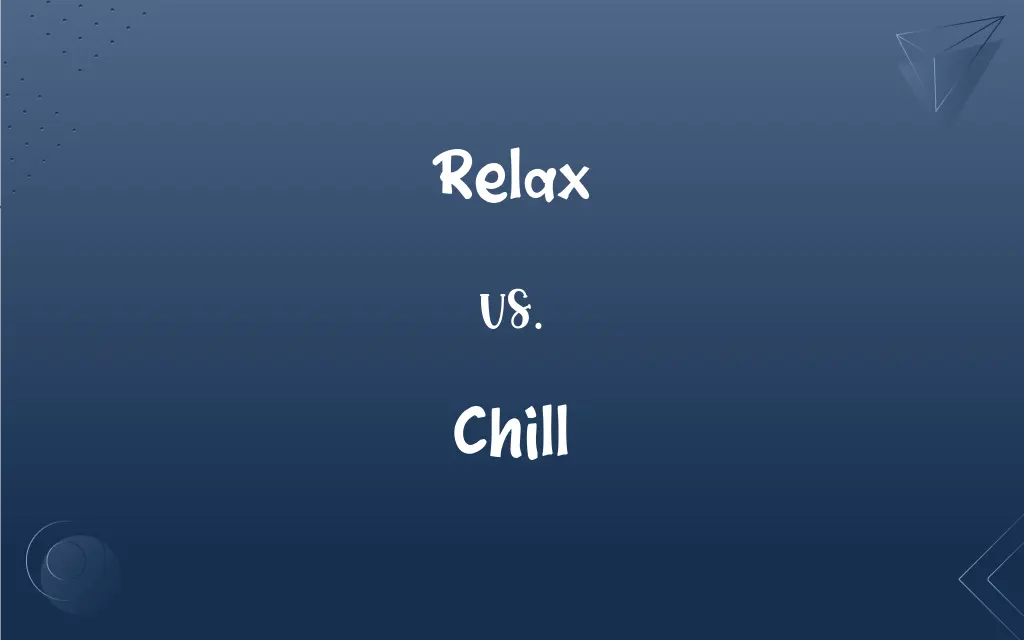Relax vs. Chill: What's the Difference?
Edited by Aimie Carlson || By Harlon Moss || Updated on November 7, 2023
"Relax" means to make or become less tense or anxious; "chill" is a slang term for relaxing, but can also mean an unpleasant feeling of coldness.

Key Differences
The word "relax" is often used to describe a state or process of becoming less tense, physically or mentally. It implies a release of tension and a return to calmness. "Chill," on the other hand, is a colloquial term that means to relax, but it also carries connotations of doing so in a leisurely or nonchalant manner. While "relax" may be used in both formal and informal contexts, "chill" is more casual and often associated with youth culture.
When one is instructed to relax, it is typically a suggestion to alleviate stress or discomfort, to take a break from activities that may be causing strain. The instruction to "chill," especially as a command 'chill out,' can sometimes be used to tell someone to calm down when they are angry or upset, carrying a more imperative tone. Relaxing is an activity that might be done in many settings, including at a spa or on vacation, while chilling is often done in informal settings, such as lounging at home or hanging out with friends.
The act of relaxing is recognized as an important part of stress management, often encouraged by health professionals. It can involve techniques such as deep breathing, meditation, or taking a bath. Chilling, while it may include similar activities, is less formal and can also imply socializing in a laid-back atmosphere, watching TV, or simply doing nothing particularly active or stressful.
In health and wellness contexts, to relax might mean to engage in a therapeutic activity or to consciously ease muscle tension. In social contexts, to chill often means to spend time with others in a relaxed environment or to engage in leisure activities without any particular goal or purpose. Relaxation is seen as a beneficial practice for both mental and physical health, while chilling is more about enjoyment and leisure.
"Relax" can be used as a directive in activities like yoga or massage, where the aim is to achieve a tranquil state of mind and body. "Chill" is less likely to be used in such structured activities and is more commonly found in phrases like "chill out" or "let's chill," which imply a laid-back approach to spending time. Both terms promote a sense of ease, but "relax" carries a broader and more general application, while "chill" is more specific to casual, social contexts.
ADVERTISEMENT
Comparison Chart
Definition
To become less tense or anxious.
Informal: To relax or take it easy.
Formality
Used in both formal and informal contexts.
Primarily used in informal, casual contexts.
Associated Activities
Meditation, yoga, therapeutic treatments.
Socializing, casual leisure activities.
Tone
Can be neutral or positive.
Can be imperative (e.g., "chill out") or positive.
Contextual Usage
Broader use, including physical and mental relaxation.
Often associated with leisure and informal relaxation.
ADVERTISEMENT
Relax and Chill Definitions
Relax
To make less tight or tense.
Relax your shoulders and take a deep breath.
Chill
An unpleasant feeling of coldness.
There's a chill in the air tonight.
Relax
To ease or reduce stress or anxiety.
She listens to classical music to relax after work.
Chill
A sensation of fear or apprehension.
The scary movie sent a chill down my spine.
Relax
To become less strict or severe.
The company decided to relax its dress code.
Chill
Slang for relaxing or calming down.
Just chill, everything will be alright.
Relax
To take time out from work or duties.
On weekends, I relax by going on hikes.
Chill
To cool something to a lower temperature.
Chill the dessert before serving.
Relax
To recline or rest in comfort.
He likes to relax in his armchair in the evenings.
Chill
Informal for spending time in a relaxed manner.
We're going to chill at my place later.
Relax
To make lax or loose
Relax one's grip.
Chill
A moderate but penetrating coldness.
Relax
To make less severe or strict
Relax a curfew.
Chill
A sensation of coldness, often accompanied by shivering and pallor of the skin.
Relax
To reduce in intensity; slacken
Relax one's efforts.
FAQs
Is it appropriate to tell someone to relax in a professional setting?
It can be, particularly if someone is visibly tense or stressed.
Can 'chill' ever mean something negative?
Yes, 'chill' can refer to an unpleasant feeling of coldness or fear.
What's a synonym for 'chill' in the context of relaxation?
"Hang out" is similar in meaning to 'chill'.
What's a synonym for 'relax'?
"Unwind" is a synonym for 'relax'.
Is 'chill' ever used in a medical context?
Yes, as in "The patient is experiencing chills."
What does 'chill' mean in social terms?
Socially, 'chill' means to hang out in a relaxed manner.
How can I use 'relax' in a sentence?
"You seem stressed; you should relax this weekend."
Can 'relax' be used as a command?
Yes, such as in "Relax your grip."
What does it mean to relax?
It means to become less tense or anxious and to unwind.
What does 'chill out' mean?
It means to calm down or relax.
Is 'chill' appropriate in formal writing?
No, 'chill' is informal and usually not suitable for formal contexts.
Can 'chill' be a physical sensation?
Yes, 'chill' can describe a feeling of coldness.
Does 'chill' have different meanings?
Yes, 'chill' can refer to coolness or a relaxed state.
Can 'chill' be used to describe music or a place?
Yes, as in "This is a chill spot" or "chill music."
How does 'chill' relate to temperature?
It can describe something that is cold or has been refrigerated.
Can 'relax' refer to physical objects?
Yes, like in "Relax the rules."
Can 'relax' imply taking a break?
Yes, like in "Take some time to relax from work."
What does it mean to have a 'relaxed' attitude?
It means to have a calm, easygoing approach.
What is the adjective form of 'relax'?
Relaxed, as in "She looked very relaxed."
Can 'relax' and 'chill' be used interchangeably?
In casual speech, yes, but 'relax' is broader and more formal.
About Author
Written by
Harlon MossHarlon is a seasoned quality moderator and accomplished content writer for Difference Wiki. An alumnus of the prestigious University of California, he earned his degree in Computer Science. Leveraging his academic background, Harlon brings a meticulous and informed perspective to his work, ensuring content accuracy and excellence.
Edited by
Aimie CarlsonAimie Carlson, holding a master's degree in English literature, is a fervent English language enthusiast. She lends her writing talents to Difference Wiki, a prominent website that specializes in comparisons, offering readers insightful analyses that both captivate and inform.































































